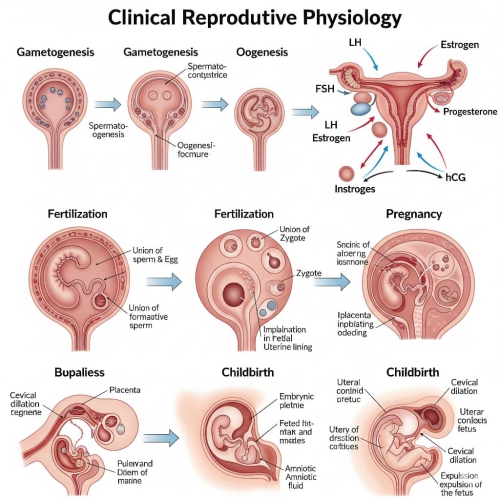Course Details
West African College of Clinical Physiology Sciences (WACCPS)
Duration: 12 Months
Target Audience: Graduates of Human Physiology and recognized health related disciplines
1. Programme Overview
1.1. Programme Title:
Professional Certification in Clinical Reproductive Physiology
1.2. Programme Objectives:
- To provide advanced training in human reproductive physiology and pathophysiology
- To develop expertise in assisted reproductive technologies (ART) and fertility diagnostics
- To enhance clinical monitoring of infertility and reproductive disorders
- To promote research in reproductive health and endocrinology
1.3 Expected Learning Outcomes:
Graduates will be able to:
- Perform and interpret fertility diagnostic tests (semen analysis, hormonal assays, ovulation tracking)
- Assist in in vitro fertilization (IVF) and intrauterine insemination (IUI) procedures
- Monitor cases of male and female infertility
- Conduct research in reproductive physiology and ART
2. Programme Structure
8 months of coursework + 4 months of clinical practicum/research
2.1 Core Modules
Module 1: Reproductive Physiology & Endocrinology (2 Months)
- Male and female reproductive anatomy and physiology
- Hormonal regulation of the reproductive axis
- Menstrual cycle dynamics and ovulation
- Pathophysiology of infertility (PCOS, endometriosis, azoospermia)
Module 2: Fertility Diagnostics & Laboratory Techniques (3 Months)
- Semen Analysis & Sperm Function Tests
- WHO standards for semen analysis
- Sperm DNA fragmentation testing
- Hormonal Profiling & Ovarian Reserve Testing
- FSH, AMH, LH, and progesterone assays
- Transvaginal ultrasound for follicular tracking
- Advanced Imaging in Reproductive Health
- Hysterosalpingography (HSG)
- Pelvic ultrasound for uterine abnormalities
Module 3: Assisted Reproductive Technologies (ART) (3 Months)
- In Vitro Fertilization (IVF) & Embryology Basics
- Oocyte retrieval, sperm preparation, and embryo culture
- Cryopreservation techniques (vitrification)
- Intrauterine Insemination (IUI) Procedures
- Semen processing and timing of insemination
- Ethical & Legal Aspects of ART
- Consent, documentation, and regulatory compliance
Module 4: Clinical Practicum & Research (4 Months)
- Hands-on training in fertility clinics and ART labs
- Research project on reproductive health trends in West Africa
- Oral defense
3. Teaching Methodology
- Didactic Lectures
- Hands-on Laboratory Training
- Clinical Rotations
- Research Supervision
4. Assessment Methods
- Written Examinations
- Practical Competency Evaluations
- Semen analysis accuracy
- Hormonal assay interpretation
- IVF lab techniques
- Research Dissertation
5. Unique Programme Features
1. Tropical Reproductive Health Focus:
- Impact of infectious diseases (e.g., PID from STIs) on fertility
- Cultural and socioeconomic factors in fertility treatment
2. Low-Cost ART Adaptations: Simplified IVF protocols for resource-limited settings
6. Career Pathways
Graduates can work as:
- Fertility Laboratory Specialists/ Embryologists in hospitals and IVF clinics
- Reproductive Diagnostic Lab Scientists
- Andrology & Embryology Technologists
- Researchers in Reproductive Medicine
7. Accreditation & Certification
Aligned with: International Education Accreditation Council (IEAC)
This curriculum addresses West Africa’s growing need for trained reproductive physiologists, combining global ART standards with region-specific fertility challenges.
Approved by: West African College of Clinical Physiology Sciences (WACCPS)
Apply Now
